
Director: Majid Majidi (2001, Persian, 94 mins)
Reviews: RottenTomatoes (89%), IMDB (7.7), Wikipedia, Amazon, Roger Ebert.
Watch online: NetFlix.
Similar movies: romance.
Summary: A beautiful movie! A simple minded Persian boy (Latif) falls madly in love with a young Afghan refugee girl. Her name is Baran, which means rain. To feed her family of six, the girl has to work in harsh conditions because her dad was badly injured at a construction site. Out of sheer compassion (not to impress her or win her over), Latif goes to great lengths to alleviate her suffering.
The two main characters hardly talk to each other. Everything is unsaid. In the entire movie, the girl never speaks a sentence. She is shy and quiet but approves of him.
Some romantic scenes made me smile. In one scene, Latif goes to the spot where the girl used to feed pigeons. He finds her hair clip with a single strand of hair caught in it :) In another scene, when he is looking for her, he meets an old cobbler who perchance remarks, "From the hot fire of being apart, comes the flame that burns the heart." :) The last scene highlights the beauty and ephemerality of all life experiences: the boy smiles happily when he sees an imprint of Baran's shoe in mud. Then it starts raining :) Baran means rain.
Other than the love story, the movie is sobering. It reminded me of harsh living conditions that so many of us endure daily. I feel blessed, very blessed.
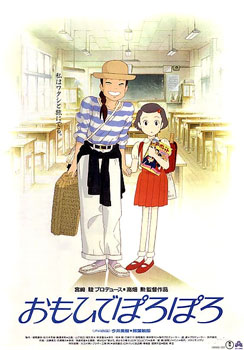
Director: Isao Takahata (1991, Japanese, 118 mins)
Reviews: RottenTomatoes (100%), IMDB (7.7), Wikipedia, Amazon.
Similar movies: anime, joyful, romance.
Summary: A lovely movie: calm and gentle like a steady stream. With comedy, nostalgia and romance packaged together into a wonderful work of art.
The story revolves around a 27-year old girl Taeko. She starts remembering her childhood, when she was nine or ten. There is no 'cat bus', no mythical creatures, no fantasy. It's real and simple. In fact, the beauty of the movie lies in its simplicity. It reminds me of movies like 'An Autumn Afternoon' by Yasujiro Ozu.
Details: Taeko is an unmarried city girl with a busy but boring life. She makes a trip to the countryside. During the trip, she starts remembering seemingly mundane events from her childhood: how she was picky and didn't like certain foods, how she had quarrels with her sisters over bags and clothes, how she was awed by big bathhouses, what happened when girls of her age started getting their periods, how her dad didn't let her participate in drama because it wasn't perceived as a good line of work, how her dad slapped her the only time in her life, how she developed feelings for a boy for the first time, how she had a difficult time understanding division of a fraction by another fraction, how she continued to feel guilty at being unkind and rejectful towards a boy who sat next to her for several months, and so on.
Scenes of the past are interleaved with scenes from the present. During her trip to the countryside, Taeko develops a friendship with Toshio, a joyful farmer who loves nature and organic farming. Slowly, Taeko realizes that her friendship is actually a deep connection because her conversations with Toshio evoke memories from the past, which help her understand herself better. Their connection is sublime. No hugs or kisses.
The movie interleaves the present and the past very well. The transitions are smooth and poetic. The interleaving increases as the movie progresses, culminating in a beautiful end sequence. As Taeko departs from the countryside in a train, she starts wondering whether her happiness lies in a career in the big city or with Toshio in the countryside. "Love knows not its own depth until the hour of separation", as Gibran says. If I close my eyes and imagine, "could I have made the end sequence any better?" Not at all. "Could I have even conceived of it?" No. The end sequence is a gem.
All in all, the movie narrates a story of self realization - what makes us truly happy? And it reminds me of creeks and forests. The most endearing conversations that I remember from my hikes centered around memories from childhood
Good review — Another good review.
Watch online: Part I — Part II — Part III — Other choices.
The closing sequence plays the song Ai wa hana, kimi wa sono tane by Miyako Harumi. The song is a Japanese version of "The Rose" by Amanda McBroom:
THE ROSE by Amanda McBroomSome say love, it is a river that drowns the tender reed.
Some say love, it is a razor that leaves your soul to bleed.
Some say love, it is a hunger, an endless aching need.
I say love, it is a flower, and you its only seed.
It's the heart, afraid of breaking, that never learns to dance.
It's the dream, afraid of waking, that never takes a chance.
It's the one who won't be taken, who cannot seem to give.
And the soul, afraid of dyin', that never learns to live.
When the night has been too lonely, and the road has been too long,
And you think that love is only for the lucky and the strong,
Just remember in the winter far beneath the bitter snows,
Lies the seed, that with the sun's love, in the spring becomes The Rose.
Somehow, I feel that the Western style of singing doesn't do justice to these lyrics. My ears are attuned to warmth and gentleness of Indian classical singers like Lata Mangeshkar, S P Balasubramaniam and Hari Haran. Anyhow, the best version on YouTube that I could discover is by Amanda McBroom herself.

Director: Jae-young Kwak (2001, Korean, 123 mins)
Reviews: RottenTomatoes (N/A), IMDB (8.2), Wikipedia, Amazon.
Watch online: Amazon Prime.
Similar movies: comedy, romance.
Summary: One of the top romantic movies from South Korea. I liked the movie, especially the last half hour. Based on a series of real blog posts by a Korean guy. Storyline: 25-year old Gyun-woo meets a terribly drunk girl in a train. He feels awkward to help her but when he does, a deep sense of responsibility develops inside him. He decides to heal her pain. As their friendship progresses, she mistreats him time and again: slapping him, pushing him into a pool, forcing him to wear her high heels, and so on. Even though Gyun-woo finds himself in a masochistic relationship, does he ever lose his cool? No. What happens in the end? See the movie.
To be honest, I got bored by the 60-minute mark, wondering why this movie is so popular. Maybe it was the picture quality on YouTube. But I persisted and I found the last thirty minutes to be quite rewarding, where the movie explains the reasons behind the girl's strange behavior.
Why do I like 'My Sassy Girl'? Gyun-woo, the guy in the movie, exemplifies a mantra that a mentor once gave me, "When you love somebody, give them a lot of room." He reminds me of Lateef in the movie Baran (Persian, 2001). Both guys go to great lengths to ease the pain of their sweethearts. While Lateef is a passionate and impulsive doer, Gyun-woo is Zen-like: calm and relaxed, no matter what happens.
An English remake of the movie in 2008 was not so great. Instead, watch the original Korean movie from 2001. I later realized that the movie is also available on Amazon Prime.

Director: Sai Paranjape (1981, Hindi, 149 mins)
Reviews: RottenTomatoes (98%), IMDB (8.4), Wikipedia, Amazon.
Similar movies: romance.
Summary: Yet to write.

Director: Hrishikesh Mukherjee (1975, Hindi, 127 mins)
Reviews: RottenTomatoes (N/A), IMDB (8.4), Wikipedia, Amazon.
Watch online: YouTube, YouTube.
Similar movies: comedy, romance.
Summary: Yet to write.

Director: Jean-Pierre Jeunet (2001, French, 122 mins)
Reviews: RottenTomatoes (90%), IMDB (8.5), Wikipedia, Amazon, Roger Ebert.
Watch online: NetFlix.
Similar movies: joyful, romance.
Summary: An adorable movie, one of my favorites.
Plot: A shy waitress spreads joy into others' lives with random, anonymous acts of kindness. Occasionally, she's mischievous too! She runs into a guy who is equally good hearted and equally quirky. Amelie is intrigued. She engages with the boy but maintains her distance, concealing her identity. At the same time, she keeps setting up elaborate trails peppered with clues leading him to her.
On the whole, the movie is artistic and joyful. Not a single dull moment. I chuckled so many times! Nominated for five oscars (didn't win any) - writing, art direction, cinematography, sound and best film. Character development, humor, storyline, dialogues and music are awesome. But above all, there is a touch of artistry that is unique to this movie that makes it special. For a brief moment, the nightlamp takes human form. Semetimes, characters in photos talk to each other. In one scene, Amélie turns into water! I sensed a touch of Miyazaki in these brief moments.
Amélie brought me much relief from the negative after effects of two movies by Bergman that I saw recently: Wild Strawberries (1957, Swedish) and The Seventh Seal (1957, Swedish). Both are awesome movies on old age and death. But Bergman's approach is depressing. Wild Strawberries haunted me for two weeks. I'm thankful to directors who make movies like Amélie to help us dispel ghosts created by Bergman's movies.

Director: Masayuki Suo (1996, Japanese, 136 mins)
Reviews: RottenTomatoes (91%), IMDB (7.7), Wikipedia, Amazon, Roger Ebert.
Watch online: NetFlix.
Similar movies: family, romance.
Summary: A successful but bored accountant in Tokyo is enamored by a beautiful woman gazing out of a dance studio window. Dancing and public display of affection are shameful in Japanese society. But his desire to meet the woman propels him to break societal norms. He starts taking lessons for western dance styles like waltz. He hides his new found passion from his wife and teenage daughter. Soon, his attraction for the woman in the dance studio becomes secondary and he starts enjoying dance for its own sake. It brings him great joy and freedom.
The movie is not a classic but lovely. What's lovely? Each character in the story: the worker, his wife, his daughter, his dance teacher, the girl he is attracted to, his office colleague and a private detective — each person is kind hearted and forgiving.

Director: Guru Dutt (1957, Hindi, 146 mins)
Reviews: RottenTomatoes (N/A), IMDB (8.4), Wikipedia, Amazon.
Similar movies: depressing, romance.
Summary: Pyaasa is a depressing but soulfully romantic movie by Guru Dutt. Great acting by all three characters: Guru Dutt, Mala Sinha and Waheeda Rehman. The word Pyaasa means thirsty in Hindi. The movie is about unrequited love.
The story revolves around Vijay, an unsuccessful poet. The role was played by Guru Dutt himself. Throughout his life, Vijay feels unloved and unappreciated. In his college days, his sweetheart dumps him because he has no secure future as a poet. She marries a rich newspaper owner instead. Later, a prostitute falls in love with him, primarily for his poetry. She remains devoted to him but Vijay is not interested in her. Soon, Vijay does acquire fame and money. At that time, his relatives take advantage of his fame to make money for themselves.
Despite being a depressing movie, Pyaasa is worth watching for its romantic moments, awesome songs and great acting.
Songs: Jaane Kya Tune Kahi — Jane Wo Kaise Log The Jinke Pyar Ko Pyar Mila — Ye Duniya Agar Mil Bhi Jaye To Kya Hai — Hum Aapki Aankhon Mein — Sar Jo Tera Chakraaye — Aaj Sajan Mohe Ang Laga Lo.
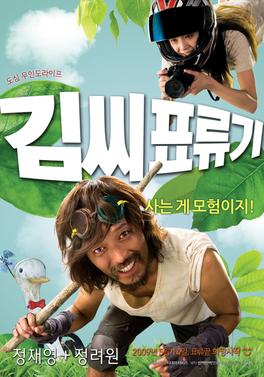
Director: Hae Joon Lee (2009, Korean, 116 mins)
Reviews: RottenTomatoes (78%), IMDB (8.1), Wikipedia, Amazon.
Watch online: YouTube.
Similar movies: romance.
Summary: A love story with a bizarre plot but lovely! Two eccentric characters fall in love in strange circumstances. The guy finds himself on an island in a river after a failed suicide attempt. The girl is somebody with severe social anxiety disorder. She discovers him on the island through her telescope. The movie critiques modern living in high rise buildings with busy, stressful lives.

Director: Basu Chatterjee (1975, Hindi, 123 mins)
Reviews: IMDB (8.3), Wikipedia, Amazon.
Similar movies: romance.
Summary: Yet to write.
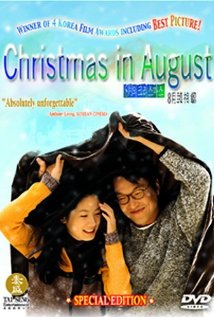
Director: Jin-ho Hur (1998, Korean, 97 mins)
Reviews: RottenTomatoes (N/A), IMDB (7.8), Wikipedia, Amazon.
Similar movies: death, romance.
Summary: Christmas in August is popular among Korean film students for its symbolism, camera work and character study. The movie is gently paced. Towards the end, there is a 15 to 20 minute long scene with almost no dialogues. The beauty of the movie lies in what all is unsaid. The actions and facial expressions of its characters convey everything. The main character in the movie is a photographer. The Wikipedia article explains the symbolism of his photos, picture frames and their locations in the movie.
Storyline: A photographer in his early thirties is terminally ill. He is living his remaining days peacefully. He has an infectious smile and from his outward appearance, he looks just fine. One day, a lovely young woman in her twenties walks into his studio. She is a parking violation officer and implores him to develop some photos quickly. The photographer obliges. The woman starts coming to his shop repeatedly. As they continue to meet, a gentle romance develops between the two. The movie is essentially a character study of these two persons, without much of a plot. Their friendship is smooth and natural, with no melodrama, no tension, no struggle. But they never hug or kiss or verbally express their fondness for each other. All along, the photographer continues to live a normal, routine life. Once or twice, he expresses anger and frustration, but only briefly.
Early in the movie, there are lovely scenes of three little boys arguing and fighting over who really is the most beautiful girl in their class. Then there is a grandmother who comes to the studio twice for her portrait shot, a young girl who wants to bury her face in her hair locks, and a family who wants their picture together.
Overall, a watchable movie. Other movies with a similar theme are Geethanjali (Telugu), Ikiru (Japanese) and Wild Strawberries (Swedish). In Geethanjali, the characters are young. In Ikiru and Wild Strawberries, the characters are old.

Director: Mani Ratnam (1989, Telugu, 142 mins)
Reviews: RottenTomatoes (N/A), IMDB (7.7), Wikipedia.
Watch online: YouTube.
Similar movies: death, illness, romance.
Summary: A romantic movie that touches upon the theme of death. The storyline reminded me of a Buddhist tale:
A woman anxiously told a monk, "My doctor has given me only a few months to live. Can you help me? I am dying." To her surprise, the monk began to chuckle. Then he said quietly, "You see, we are all dying. It’s only a matter of time. Some of us just die sooner than others."
The movie is entertaining. Like a Hindi masala movie. Acting by the lead actress (Girija Shettar) is pretty good. Songs by S P Balasubramaniam and Chitra are "wow"!
An awesome song in the movie is Om Namaha by S P Balsubramaniam and Chitra. It sounds like a Sanskrit prayer but it is actually a romantic song filmed around the two protagonists absorbed in a three minute long kiss. Translation of Om Namaha. Lyrics are by Veturi, Gulzar of Telugu Cinema.

Director: Stanley Kramer (1967, English, 108 mins)
Reviews: RottenTomatoes (65%), IMDB (7.7), Wikipedia, Amazon, Roger Ebert.
Watch online: Amazon Prime.
Similar movies: family, joyful, romance.
Summary: A brilliant movie. The story revolves around a rich white liberal San Francisco couple. Their 23-year old daughter comes home from a trip to Hawaii along with a 37-year old black man who lost his wife and son in an accident many years ago. The man is a famous doctor with a long list of accomplishments. His dad is a retired mailman. The love birds announce that they are getting married within a few days. In 1967, such a marriage was a criminal offence in many states in USA. The couple spend the afternoon and the evening with the girl's parents. Later, they are joined by the boy's parents and a reverand.
The movie showcases how various people in the situation react: the girl, his mother, his father, their maid, the boy, his mother and his father. I chuckled many times. The plot, the characters and the dialogues are entertaining. For the first several minutes, the movie felt like a play but I quickly got used to it.
The Indian connection is that a lot of modern marriages are between couples from different family backgrounds. Some have different native languages. In a few cases, even the religion is different. The movie shows how parents react to an announcement by their children that they have fallen in love with somebody that their parents may never have imagined. The relationships between the mothers and their kids, the relationships between the dads and their kids and with each other - these are brought out well.
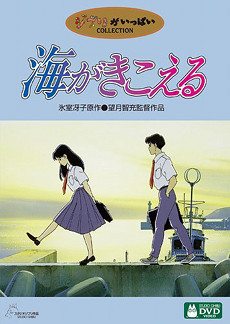
Director: Tomomi Mochizuki (1993, Japanese, 72 mins)
Reviews: RottenTomatoes (N/A), IMDB (7.0), Wikipedia, Amazon.
Similar movies: anime, romance, separation.
Summary: A lovely movie with a deceptively simple story. Critics call this an underrated movie from Studio Ghibli. Never dubbed in English; relatively unknown in the West. I loved watching it.
Two friends are attracted to the same girl who just got transferred to their school. One friend realizes quickly about his attraction, the other does not. The girl is pretty, excels in academics, is outspoken but rude. She consciously stays away from any social interaction. She has hardly a friend. Slowly, it emerges that her mom has moved to a new city; her parents are getting separated. She loves both parents and is conflicted. For example, when it is time to graduate, she starts applying to colleges in both cities.

Director: Vijay Anand (1965, Hindi, 120 mins)
Reviews: RottenTomatoes (96%), IMDB (8.4), Wikipedia, Amazon.
Similar movies: romance.
Summary: Guide reminds me of Valmiki and Angulimala, both of whom were robbers and killers before they turned spiritual. The main character in Guide is Raju, a former tourist guide who is in jail for signature forgery. Upon his release from jail, he wanders off on foot. One day, when he wakes up, he finds a saffron robe on himself. Somebody had left the robe on him to shield him from cold. Seeing Raju's robe, villagers start believing that he's a renunciate, a 'sadhu' (saint). Bemused, Raju starts acting like one!
Most of the movie is a flashback which shows Raju's previous life as a skillful tourist guide who is blessed with the gift of gab. He falls in love with the neglected wife of a wealthy man and helps her realize her lifelong dream of becoming an accomplished dancer. As the two of them become rich and famous, they also drift apart. Raju starts drinking and gambling. Out of jealousy, he commits signature forgery, a crime that lands him in jail.
The last half hour of the movie is inspiring. A severe drought is ravaging the countryside. By a quirk of fate, Raju finds himself pressurized into a 12-day fast without food and water (!) The villagers believe that Raju's fast will appease the gods. As his fast progresses, Raju undergoes great internal conflict and even hallucinates. Two dialogues caught my attention:
- Villagers from afar come to see Raju and pay their respects. Raju realizes that his fast is transforming people by reminding them of a power greater than themselves. He introspects, "Why am I struggling? Why not become a mere observer, an instrument in the hands of the higher power, to just be and to see how things unfold instead of trying to control them?" These thoughts strengthen Raju's resolve to continue fasting.
- In another scene, there are two versions of Raju engaged in a conversation: a worldly Raju and a saintly Raju. The worldly Raju is suffocating and begs the saintly Raju for relief by breaking the fast. The saintly Raju recognizes the worldly Raju as his ego or Ahaṃkāra. As Raju relinquishes his ego and breathes his last, he experiences great peace and joy (no tension, only calmness in his dying moments). At the same time, there is a downpour.
On the whole, the movie is well done. It is fast paced, with many plots interwoven nicely. Most characters are shades of black and white. An important theme in the movie is the emancipation of Rosie (Waheeda Rehman), a neglected wife of a wealthy man. Rosie flourishes in the company of Raju. She realizes her dream of becoming an accomplished dancer. In 1965, the idea of an Indian woman getting divorced from her husband and successfully pursuing her dreams was ahead of its times.
Songs are very good! My favorite song is Tere Mere Sapne, Ab Ek Rang Hain - beautiful lyrics:
तेरे मेरे सपने अब एक रंग हैं
हो... जहाँ भी ले जाएं राहें, हम संग हैंतेरे मेरे दिल का, तय था इक दिन मिलना
जैसे बहार आने पर, तय है फूल का खिलना
ओ मेरे जीवन साथी...तेरे दुख अब मेरे, मेरे सुख अब तेरे
तेरे ये दो नैना, चांद और सूरज मेरे
ओ मेरे जीवन साथी...लाख मना ले दुनिया, साथ न ये छूटेगा
आ के मेरे हाथों में, हाथ न ये छूटेगा
ओ मेरे जीवन साथी...
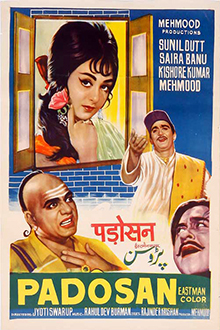
Director: Jyoti Swaroop (1968, Hindi, 157 mins)
Reviews: RottenTomatoes (87%), IMDB (8.1), Wikipedia, Amazon.
Watch online: YouTube, YouTube, Amazon Prime.
Similar movies: comedy, romance.

Director: Hrishikesh Mukherjee (1975, Hindi, 150 mins)
Reviews: RottenTomatoes (85%), IMDB (7.6), Wikipedia, Amazon.
Watch online: YouTube, YouTube.
Similar movies: illness, romance.
Summary: Yet to write.

Director: Hrishikesh Mukherjee (1973, Hindi, 124 mins)
Reviews: RottenTomatoes (N/A), IMDB (7.9), Wikipedia, Amazon.
Watch online: Amazon Prime.
Similar movies: romance.
Summary: Yet to write.

Director: Yoshifumi Kondo (1995, Japanese, 111 mins)
Reviews: RottenTomatoes (90%), IMDB (7.9), Wikipedia, Amazon.
Watch online: WatchAnimeMovie.
Similar movies: anime, childhood, joyful, romance.
Summary: Whisper of the Heart is a lovely movie about two teenage students falling in love with each other. Screenplay is by the famous Japanese director Hayao Miyazaki. No symbolism, no message. Simple, lighthearted movie that made me smile. If you loved somebody and your feelings were reciprocated, then this movie will remind you of those special, magic moments :)
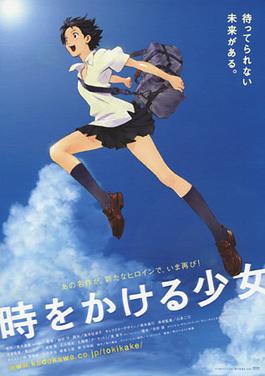
Director: Mamoru Hosoda (2006, Japanese, 98 mins)
Reviews: RottenTomatoes (87%), IMDB (7.8), Wikipedia, Amazon.
Watch online: YouTube, WatchAnimeMovie.
Similar movies: anime, romance.
Summary: An entertaining movie. A teenage girl Makoto discovers that she can go back in the past. She starts using this ability to fix small things in her life: eat a pudding before sister eats it, avoid socially embarrassing situations, fix relationships between others and her own, and so on. For the first hour or so, I got increasingly tired.. I was thinking, "oh, boy! yet another teenage romance movie.." Then suddenly, time stopped .. everything came to a standstill and the storyline took a turn. The scene in which time stops is nicely done. Makoto discovers why she is time traveling. She also discovers purpose in her life: to serve others, keeping the future in mind.
Comparisons with Groundhog Day (1993, English) are natural. In Groundhog Day, the protagonist does not have control over time travel. Every day, he wakes up to the same date and events unfold in more or less the same way. This repetition does not go away until he makes peace with a certain woman through changing his own behavior. The storyline reminds me of rebirth in Indian philosophy, or the general idea that we face the same situation again and again until we recognize our own habit patterns of negative reactions and fix these habit patterns to become peaceful.
About Time (2013, English) is a copy of The Girl Who Leapt Through Time. I saw it a few weeks ago and found it very boring. The Japanese movie resonated much more with me.
An insightful review tracing the history of time travel genre in Japanese culture: here.
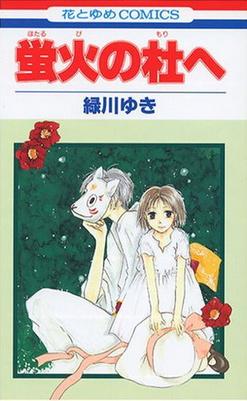
Director: Takahiro Ômori (2011, Japanese, 45 mins)
Reviews: RottenTomatoes (N/A), IMDB (7.7), Wikipedia, Amazon.
Watch online: YouTube, WatchAnimeMovie.
Similar movies: anime, romance, separation.
Summary: A touching story of friendship between Hotaru and Gin. At the age of six, Hotaru is lost in a forest near her grandfather's home in the countryside. She is rescued by Gin, a forest spirit that never ages. He looks like a young man and almost always wears a mask. The twist in the plot: if Gin ever touches a human, it will cause him to disappear forever. Hotaru returns every summer to meet Gin, who eagerly awaits her return. As Hotaru grows into a young woman, their friendship becomes romantic and limitations emerge. For example, she wants to "glomp" Gin but can't. Overall, a watchable movie showcasing romance with a twist. Background music is good.
I discovered this movie at Anime Movie Guide, which reviews all Japanese anime movies worth watching.

Director: James Ivory & Ismail Merchant (1985, English, 117 mins)
Reviews: RottenTomatoes (100%), IMDB (7.5), Wikipedia, Amazon, Roger Ebert.
Similar movies: comedy, romance.
Summary: A Room With A View is a love story with a positive ending, based on a novel by E M Forster. It won some Oscars too.
The main characters of the movie are super rich people who dress up in fancy clothes every day. The time period is Victorian England, when physical or public display of affection was against the norms. Tracing Social Values in E M Forster's 'A Room With A View' analyzes how the story showcases a shift in social values from Victorian to Edwardian at the dawn of the twentieth century in England.
The story revolves around a girl named Lucy. On a vacation, she meets a passionate adonis named George, who instinctively smooches her when he senses that there is mutual attraction between the two. They meet only a few times, but always surrounded by others. A few months later, Lucy decides to marry Cecil, a socially suitable suitor whom she is not really attracted to. It's a case of choosing between what the heart says and what social norms dictate. What happens in the end?
A Room With a View is the most popular movie by Ismail Merchant and James Ivory who worked together for over 40 years. The movie is slowwww but builds up as it progresses. Initially, it felt like a play and the degree of formalism was funny but nauseating. But then I got used to it, even enjoying it. The only person who seemed 'normal' was Lucy's brother, a carefree soul. On the whole, 'A Room With A View' is a watchable movie, a light hearted romantic story with a positive ending.
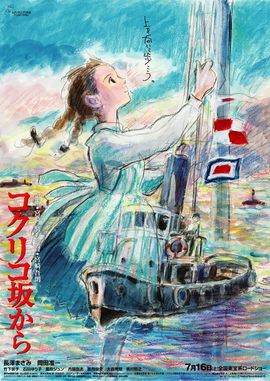
Director: Goro Miyazaki (2011, Japanese, 91 mins)
Reviews: RottenTomatoes (83%), IMDB (7.3), Wikipedia, Amazon, Roger Ebert.
Similar movies: anime, joyful, romance.
Summary: A lovely movie made by Hayao Miyazaki's son. What I liked was the fluidity - everything is natural, people are good hearted and there's no melodrama. Like the movie 'Whisper of the Heart' but with a twist that gets resolved in the end.

Director: Michel Gondry (2004, English, 108 mins)
Reviews: RottenTomatoes (93%), IMDB (8.4), Wikipedia, Amazon, Roger Ebert.
Similar movies: quirky, romance, separation.
Summary: An intriguing movie that explores selective erasure of memories. Storyline: To ease his pain, a heartbroken guy decides to undergo an operation to permanently erase all memories of his beloved. While the operation is in progress, he starts having second thoughts. He realizes that many moments being erased were really pleasant and he doesn't want to lose them.
A memorable quote from the movie:
"How happy is the blameless vestal's lot!
The world forgetting, by the world forgot.
Eternal sunshine of the spotless mind!
Each pray'r accepted, and each wish resign'd"
The above lines are from a poem 'From Eloise to Abelard' by Alexander Pope. Explained very well here. Cut n paste from the article:
The first line states that an innocent pure woman is a happy one.The second line is reinforcing the first, stating that the woman's happiness is due to forgetting about the world's woes, and being forgotten by the world. In other words, she neither worries about the world, nor does the world worry about her. She has forgotten, and has been forgotten.
The third line is again referencing forgetfulness, stating that a mind unclouded or spotted by memory is in eternal brightness, or sunshine.
The fourth line states that her every prayer has been accepted (her prayer is for forgetfulness), and that she's given up all claims on any wishes she might have, save to forget.
In short, she is happy only because she has prayed for and received the gift of forgetting everything she's been concerned about. There is an old adage that ignorance is bliss, and such is the case for this woman.
Incidentally, the words may come from the movie, but they are originally from a poem by Alexander Pope titled Eloisa to Abelard."
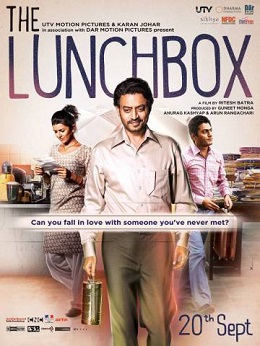
Director: Ritesh Batra (2013, Hindi, 104 mins)
Reviews: RottenTomatoes (94%), IMDB (8.0), Wikipedia, Amazon.
Similar movies: city life, loneliness, old age, romance, separation.
Summary: Nicely done! A good review at Boston Globe.

Director: David O Russell (2012, English, 122 mins)
Reviews: RottenTomatoes (92%), IMDB (7.8), Wikipedia, Amazon.
Similar movies: comedy, illness, romance.
Summary: A fast paced, wild, romantic comedy from 2012 with eight Oscar nominations. The theme of the movie is quite serious but it's presented with so much humor! The two key protagonists are suffering from psychological problems caused by loss of their respective partners, one to death, the other to divorce. Fate brings them together and a delicate romance develops between them. Superb dialogues, many of which are insightful.
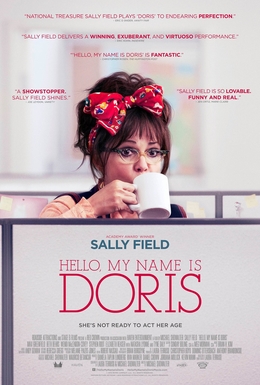
Director: Michael Showalter (2016, English, 95 mins)
Reviews: RottenTomatoes (N/A), IMDB (6.7), Wikipedia, Amazon, Roger Ebert.
Similar movies: comedy, loneliness, romance.
Summary: My Name is Doris is a comic, half-serious movie about old age, loneliness, romance, letting go and moving on. The movie revolves around a 69-year old woman named Doris whose mom just passed away. She lived with her mom almost all of her life, taking care of her. Doris has a habit of hoarding, just like her mom. After her mom's death, she has to come to terms with her loneliness and establish a new life. Most of the movie revolves around her attempts to woo a much younger colleague that she has a crush on.
The movie is relatively fast paced and engaging. The story keeps ticking, scene after scene. Acting by Doris (played by Sally Field) is awesome! On the whole, an enjoyable movie.

Director: Sharat Katariya (2015, Hindi, 110 mins)
Reviews: RottenTomatoes (N/A), IMDB (7.5), Wikipedia, Amazon.
Similar movies: city life, family, romance.
Summary: A beautiful movie that shows how a couple comes together after serious conflicts from the first day of marriage.

